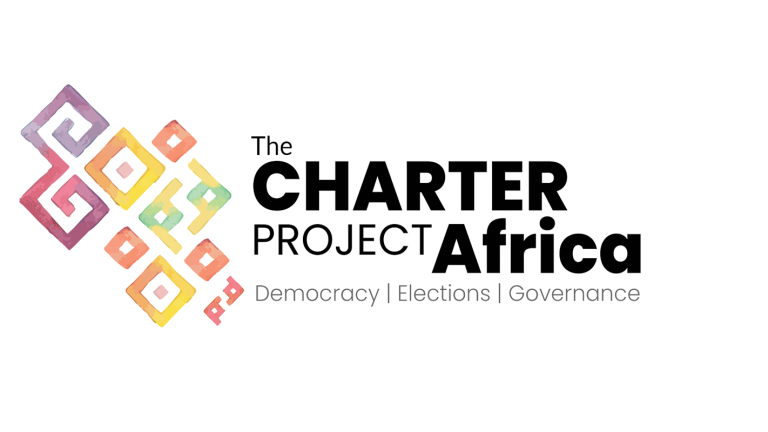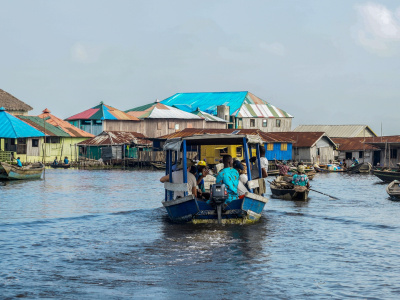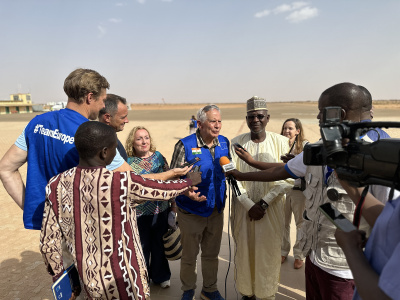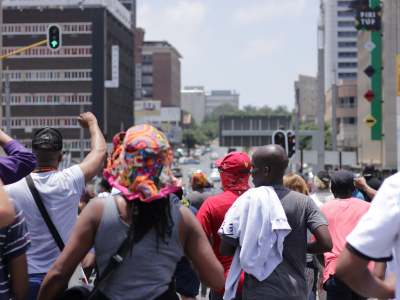
Can ECOWAS still defend democracy in West Africa after the Niger coup?
With the toppling of Nigerien president Mohamed Bazoum on 26 July, 4 out of 15 member states of the Economic Community of West African States (ECOWAS) turned from contested and fragile democracies into military dictatorships in the last three years. It is becoming clear that ECOWAS’ governance framework and its flagship policy of zero tolerance for unconstitutional changes of government are failing.
As ECOWAS is stepping up its rhetoric in the hope of halting the region’s rapid militarisation, can it also step up its actions? Should it change tack to start addressing the root causes of coups? Or is it time to admit failure and scale down the anti-coup policy, to start accepting military regimes back into the fold before the region disintegrates?
With a spate of military coups in the greater Sahel region, democracy is under attack in West Africa. It explains why the region’s remaining civilian leaders are keen to take action against coups. Yet ECOWAS’ forcefulness surprised many observers when it promptly issued an ultimatum threatening military intervention to remove the putschist government in Niamey. This unprecedented threat was accompanied by responses ranging from economic sanctions, asset freezes and interrupting electricity supply to the closing of land and air borders and Niger’s suspension from ECOWAS.
ECCAS does not have ECOWAS’ asset: Africa’s most advanced regional framework for addressing governance among member states.
By contrast, when the military seized power in Central African Gabon on 30 August, there were limited regional reactions. There are many reasons for this difference in treatment. Some are linked to the type of leaders that were deposed: in Niger a president who acceded power recently in his country’s first peaceful handover of civilian power; in Gabon the newly re-elected face of an autocratic dynasty in power almost since independence. But another explanation is that the Economic Community of Central African States (ECCAS), of which Gabon is a member (and the current chairperson), does not have ECOWAS’ asset: Africa’s most advanced regional framework for addressing governance among member states.
See also our interactive tool reviewing the governance frameworks of all African regional economic communities.
Looking back: ECOWAS’ governance role and its ambiguity
As its name indicates, ECOWAS was first meant to be an intergovernmental economic union. Yet as the region struggled with destabilising civil wars and military coups that threatened democratic progress of the 1990s, its member states turned their community into a custodian of democratic norms. A key milestone in this process was the adoption of a forward-looking democracy protocol in 2001, which inspired the pan-African governance charter and paved the way for the organisation to have a say in governance matters across the region.
As the timeline below shows, this was not a linear process, but for over two decades now the organisation has had tools to respond not only to unconstitutional changes of government, but also to breaches of human and political rights. It has been doing so through dialogue, sanctions and the deployment of election monitors, mediation missions and even armed forces in a few cases, as well as by offering judicial remedy at its court of justice.
Recent military operations under the ECOWAS flag show that the organisation is able to project force in small member states such as The Gambia (2017) or Guinea Bissau (2022) – especially with support from the United Nations and Western partners. As recently as December 2022, ECOWAS announced the creation of a regional force capable of intervening to restore constitutional order. It is worth noting that ECOWAS was not only quick to react to the Niger coup, but also set the tone for other regional reactions, including for instance sanctions by the smaller but more integrated West African Economic and Monetary Union (WAEMU, or UEMOA in French) of which Niger is also a member.
Setting norms is one thing; enforcing them consistently is another. At times the community’s mediations and interventions helped resolve situations, but overall, ECOWAS’ substantial arsenal of tools was no match for the immense task of consolidating democratic governance across the region. By the time ECOWAS’ ultimatum to Niger expired quietly, other military regimes from the region had announced that they would support Niger militarily should it come to war, and some member states expressed reservations. Hence, the prospect of an intervention under the aegis of ECOWAS soon appeared unrealistic, adding to the many criticisms of its double standards and inability to stop coups.
But beyond its lack of success at stopping unconstitutional changes of government, ECOWAS also failed to limit presidential mandates and to call out problematic (re-)elections of leaders and cases of alleged corruption. In other words: it has been selective in enforcing democratic norms and focused primarily on attempting to protect elected heads of states from coups.
This selectiveness of ECOWAS can easily be explained by the nature of the community as an inter-governmental organisation. Like similar organisations, it responds primarily to the demands of governments, which make use of ECOWAS' potential to consolidate their position as elected officials, possibly threatened by coups and likely interested in extending their time in office, but not keen to submit themselves to additional accountability. As a result, whenever ECOWAS sought to curtail the practice of extending presidential powers beyond two terms, there was always enough opposition to derail the proposals (with vetoes by Togo, The Gambia and Senegal for instance).
Yet many across the region reject the dichotomy between good elections and bad military coups – the idea that any elected leader is legitimate and all coups are illegitimate. Many see unconstitutional changes of government as a necessary evil – the continuation of politics by other means – and the main method to get rid of disastrous governance by elected officials that cling to power by all means. A recent poll suggests that a majority of West African populations support the Niger coup, with highs nearing 80% of approval ratings in Mali. The increasing tolerance for coups was also detected by Afrobarometer’s polls.
In contrast with ECOWAS’ focus on legal constitutional continuity, the governance aspirations of citizens in the region are much more about human rights, the effectiveness and accountability of public action, and the ability to get their voices heard. At best, ECOWAS has had mixed results in governance areas such as anti-corruption, the use of natural resources, or inclusivity of women, young people and minorities. ECOWAS military interventions have not addressed jihadist insurgencies that prosper in many remote parts of the Sahel, nor have they attempted to restore the rule of law there.
The discrepancy between popular demand and what ECOWAS offers generates the perception that it is primarily a club of self-serving heads of states and governments that seek to stay in power by addressing only the parts of the governance agenda that play in their favour.
The discrepancy between popular demand and what ECOWAS offers generates the perception that it is primarily a club of self-serving heads of states and governments that seek to stay in power by addressing only the parts of the governance agenda that play in their favour. This is compounded by the fact that the leaders that spearhead ECOWAS’ tough stance on coups – including newly appointed ECOWAS chair and Nigerian president Bola Tinubu – are politicians whose authority is contested in their home country. The same democratic rules that allowed these leaders to accede to power also keep them on edge… and keen to use any mechanism to consolidate their power.
Looking ahead: three scenarios for the future of ECOWAS’ role on governance
Theories abound on why ECOWAS immediately resorted to the threat of military force in Niger. Some called the takeover ‘one coup too many’, or insisted on its singularity (starting with the democratic unction of the deposed leader). Others suggested that the support of Western countries that have military forces stationed in Niger – especially former coloniser France – encouraged the organisation’s hard stance.
Many have pointed to the personality of ECOWAS leader Bola Tinubu, who suffered at the hands of a military regime in his country, and put his personal credibility on the line with inaugural statements in July vowing no tolerance for unconstitutional changes of government. He is also a civilian without military experience… and a businessman whose instinct must have been to start the negotiation with the Niger putschists on a strong note.
Be that as it may, the intervention rhetoric has fallen flat and the episode is likely to stimulate the growing solidarity between the region’s juntas. United by their lack of democratic credentials and their rejection of French influence (although they differ for instance in their ties with Russia, closer in Mali than in Niger), juntas are likely to become a stronger international pressure group.
The remaining ECOWAS can function without them: with 11 member states and without 4 suspended ones. But it is keen to reintegrate juntas, possibly as soon as they indicate credible commitments to civilian transition. Reintegrated juntas would be able to further undermine from within any plans to impose democratic norms, turning an uphill battle into a mission impossible. As the fall of the fourth member state in three years brings ECOWAS to a crossroads, several routes are open to the organisation.
Scenario 1: Defensive consolidation
In this scenario, the civilian ‘ECOWAS-11’ tighten their ranks and adopt new tools to act against unconstitutional changes of government, such as a stronger military alliance. They double down on sanctions and the military intervention narrative, although their citizens and parliaments are unlikely to let them go into risky military ventures. They establish a cordon sanitaire around military regimes: they refuse to reintegrate them, as part of the strategy to deter future unconstitutional changes of government.
This can lead to reinforcing the cohesion of the four transition countries and dislocate the region into a bloc of eleven and one of four. But the reduced ECOWAS-11 (which may lose or gain members as further unconstitutional changes of government and political transitions take place) may also be substantially consolidated in the process.
A precondition for this scenario would be international support (by way of African Union and United Nations endorsements) as well as funding and capacity training to make ECOWAS-11 military forces able to more credibly address situations such as the Niger coup. It would also require unity of purpose around the common objective of heads of states to secure their position against unconstitutional changes of government, although not all West African countries are similarly at risk.
Scenario 2: Proactive consolidation
The ECOWAS-11 revive the motto of an ‘ECOWAS for the people’ and start addressing more substantially the drivers of coups: longevity in power of leaders, corruption, statehood vacuum, security challenges, democratic culture and international influences. The leaders that refuse to submit themselves to scrutiny are lambasted and suspended. Third presidential terms and dubious elections become a cause for reaction in the same way that unconstitutional changes of government have been lately. New coups against leaders seeking a third mandate or with an otherwise problematic record are addressed by ECOWAS with more leniency.
All the while, ECOWAS invests energy in negotiating and closely monitoring transition plans with the juntas, with clear criteria for their gradual readmission conditional to civilian rule resuming.
A precondition would be for leaders in member states to feel vulnerable to pressures from their military forces, but also from civil society and international partners, and ready to face more accountability as the price to pay to improve their support.
Scenario 3: Normative disintegration
In this scenario, the region’s leaders accept the failure of their joint democratic agenda and agree to focus on areas where they have more chance – and more immediate pressure – to succeed. This can be prompted for instance by urgents threats linked to health, climate change or security. Governance norms are unlikely to be formally repelled, but they become largely dead letter.
ECOWAS-11 leaders speed up the reintegration of the suspended juntas so that the region can act as one again in the face of common challenges. Minimal transition plans are still agreed, but the reintegration proceeds regardless of whether the countries return to democratic order.
A precondition would be for the region’s leaders to feel a strong unity of purpose and urgency to collaborate that justifies downgrading democratic ambitions. This joint purpose could be about getting rid of foreign influences to propose a new regional or pan-African agenda, or fighting a specific crisis.
Turning a crisis into an opportunity
ECOWAS’ focus on constitutional continuity is increasingly contested by populations, and the balance of power within the region is progressively shifting towards military regimes. The bloc cannot continue pursuing its democratic agenda as before – by escalating rhetoric on zero tolerance for unconstitutional changes of government while failing to address the spate of coups and their root causes.
Existential crises can be powerful drivers of further regional integration, and a reduced number of active members can also help go further and faster. So it may be that West Africa will come out of these challenging times better organised. ECOWAS' policy framework on governance is already comparatively impressive; if it were to be more successful, it would soon be a strong inspiration for the rest of Africa and the world.
For instance, the current double standards in ECOWAS’ response to coups could be turned into a policy of ‘zero tolerance for bad coups’. This would undoubtedly stir an important debate on what constitutes a good or a bad coup, with third-term inclinations of the deposed leader as a possible benchmark. Such a policy would create powerful leverage to keep the autocratic tendencies of elected leaders in check and to encourage their integrity, in line with their citizens’ demands.
What the future holds for ECOWAS is likely to be a mix of elements from the three scenarios proposed above. One would hope that the region does not head towards escalation and fragmentation, and instead manages to recreate unity around common objectives such as addressing the governance concerns of citizens – not only those of heads of states.
Elements that will influence the orientations of ECOWAS’ democracy agenda include the ability and willingness of juntas to ensure transitions back to civilian rule, the personality and priorities of ECOWAS leaders, the readiness of external actors to support but also to know when to disengage, and the ability of civil societies to make their voices heard to promote a more people-driven ECOWAS agenda.
This publication is based on research conducted within the Charter Project Africa. It is co-funded by the European Union. Its contents are the sole responsibility of the author and do not necessarily reflect the views of ECDPM or the European Union.














